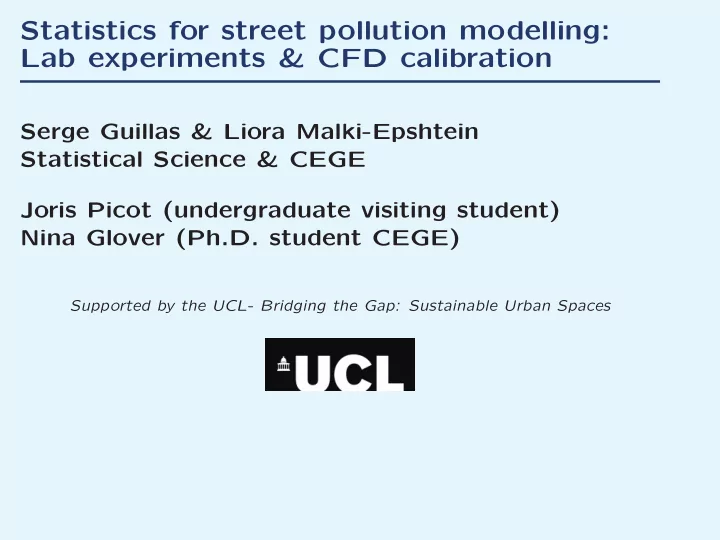

Statistics for street pollution modelling: Lab experiments & CFD calibration Serge Guillas & Liora Malki-Epshtein Statistical Science & CEGE Joris Picot (undergraduate visiting student) Nina Glover (Ph.D. student CEGE) Supported by the UCL- Bridging the Gap: Sustainable Urban Spaces
Water Tunnel experiments 1. understand the pollution in street canyons 2. lab experiments in a water tunnel, speed flows 3. speed meters locations issue 4. validation of locations 5. CFD modelisation (on-going!)
Speed vertical profiles along the water tunnel initially considered. High speed was selected.
Validation of the choice of locations Leave-one-out Diagnostics: 1. remove a speed flow meter location 2. predict speed flow there using all the other measures. Method used: kriging 3. compare the predictions with the original data
Comparison of leave-one-out predictions and observations over all sites (zeros correspond to boundary conditions)
Speed flows
Speed flows standard errors
Calibration of CFD computer model Parameters that give best model outputs? Denote input parameters z = ( x, u ) . Two categories: • known parameters (controllable parameters x ): geometry of the street cayon, size of car, temperature,.. • unknown parameters (calibration parameters u ): inlet speed, eddy length scale and turbulence
Data sampling and computer model representation: 1. Computer experiments are expensive and time consuming..so small subset of the parameters: design 2. In between, emulate the computer model by a Gaussian process response-surface (Sacks et al. 1989, Welch et al. 1992, Morris et al. 1993)
CFD runs under 20 combinations of the parameters
Representations of model bias and uncertainty: Kennedy and O’Hagan (2001): y R : reality y M : model output y F : field data Bias b u ( x ) and observation error ε : y R ( x ) = y M ( x, u ) + b u ( x ) y F ( x ) = y R ( x ) + ε
Calibration procedure: • fully Bayesian procedure: prior knowledge elicitation • MCMC approach with Metropolis-Hastings • draw realizations from the posterior distribution
Conclusion and future work • accurate measurements, but only one slice, enhanced measurements necessary to understand the flow • computational cost of CFD huge! Use of CFX on parralel cluster: Legion at UCL • sequential design? (Gramacy and Lee, ’09) • improved choice of parameters for the numerical model
Recommend
More recommend